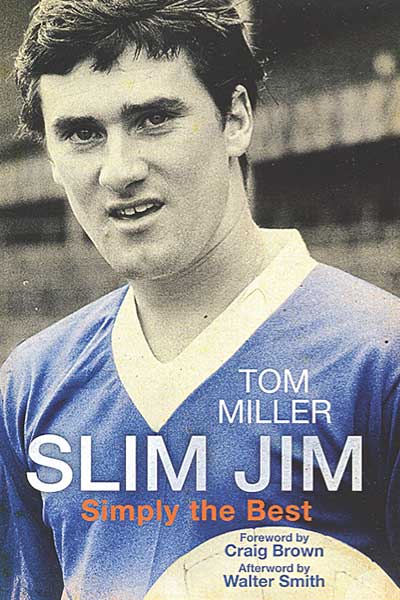 Simply the best
Simply the best
by Tom Miller
Black & White, £9.99
Reviewed by Gordon Cairns
From WSC 337 March 2015
The radio football parody Only An Excuse captured the Scottish perception of Jim Baxter almost to perfection back in the 1980s. His character explains his most famous performance, against England in 1967 where at one point he juggled with the ball: “I had a couple of great teachers… and three White & Mackays and a double Grouse, before I went on the pitch, like. That would explain the languid fluidity.” Unfortunately, the only inaccuracy was the choice of spirit – Baxter preferred Bacardi over whisky. Tom Miller tries to expand on the popular caricature of an incredible footballer who loved a drink by offering an explanation for Baxter’s self-destruction in this new biography, with somewhat limited results.
James Curran Baxter is often described as Scotland’s greatest player but ended a 12-year playing career with only ten domestic medals, which was not a lot given that Rangers were the dominant team in Scotland for most of his time at Ibrox. Perhaps that is why his eulogists focus on individual performances, including two victories at Wembley and being picked for a Rest of the World select. However the extent of Baxter’s drinking and lack of training must surely limit claims that he was truly world class. Although alcohol abuse was rife in the football culture of the 1960s, it’s questionable whether you can consistently operate at the top level with high volumes of alcohol in your bloodstream – Pelé and Eusébio weren’t playing with hangovers.
It seems Baxter’s problem was that he simply didn’t value the natural ability that raised him out of the ordinary, his career a long attempt at sabotaging the skill he possessed. In the most interesting chapter, sports psychologist Tom Lucas examines how never being acknowledged by his birth parents as their son during his playing career may have affected Baxter. (He grew up thinking his real mother was his aunt, who he was raised by.) Lucas’s conjecture is that the pitch was the only place Baxter could escape from the pain of rejection by his mother while his womanising could be connected to his feelings of abandonment.
Published two years after what was billed as “the definitive biography”, the bulk of this book rehashes the well-worn tales of Baxter’s drinking, gambling and occasional footballing. Miller, an in-house commentator for Rangers, didn’t have to wander far in his choice of interviewees, the majority of whom seem to come from the club’s “family”, including current defender Darren McGregor and youth-team coach Davie Kirkwood, I assume because both had played for Fife clubs like Baxter, hardly justifying their inclusion. Baxter’s own voice is barely heard, yet for most of his playing career he wrote syndicated columns. Although ghost-written, surely a trawl through these would have unearthed something more relevant than how McGregor felt when he joined Rangers.
The inclusion of two poems and a selection of pen portraits from the back of football cards feel like fillers to make the book up to the required length. There is no interview with Alex Ferguson, who played alongside Baxter; Scotland’s greatest manager’s views on getting the best from Scotland’s most talented player would have been compelling. Neither is there any input from Baxter’s sons or first wife, which could have given greater insight into how he felt about family, especially if he had issues about abandonment.